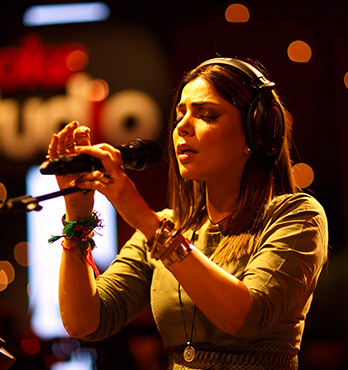Daachi Waaliya

by Ayesha binte Rashid
Daachi Waaliya is a song that beseeches — its lyrics paint a picture of a lonesome heart, calling out for an escape from its solitude. The speaker hopes to find this escape in a camel-rider, and this is the daachi waaliya – camel-rider – that is being addressed in the song. They call out to the camel-rider, “ daachi waaliya mor muhaar ve, ve saahnoon le chal apne naal ve,” — o-camel rider, turn your camel around and come back; please take me along with you.
The speaker sings of the camel-rider’s daachi (female camel), of the tinkling bells around her neck and her elegant gait. They speak of reverently kissing the daachi’s hooves, were she to return, bringing the camel-rider with her. There is yearning and sorrow in the speaker’s words: they pray that God keeps their beloved safe, that this separation doesn’t ruin them.
Certain interpretations of Daachi Waaliya call back to the story of Sassi and Punnu, one of the seven great romances narrated by the Sufi saint and scholar Shah Abdul Latif Bhittai in his Shah Jo Risalo. Bhittai tells us that Sassi was born to the Raja of Bhambour in present-day Sindh but was, due to an astrologer’s prophecy, abandoned at birth, put in a basket and set afloat in the Indus River. Downstream on the Indus, Sassi was found by a dhobi (clothes-washer) who took her in as his own daughter.
With time, Bhittai writes, Sassi grew up to possess great beauty and word traveled throughout the land of this young woman’s charming looks, reaching the ears of Punnu, a prince who lived amongst the hills of Kech Makran in Balochistan. With time, and fate, Sassi and Punnu found each other, Punnu traveling to Bhambour in disguise and, eventually, winning her heart. Sassi and Punnu get married, and Punnu settles down to a modest lifestyle with Sassi and her loved ones in her village. When news of this reaches Punnu’s father, Raja Aari Jam, he is angry and upset, demanding that his son return to court and disown the humble way of life he has adopted.
The Raja sends Punnu’s brothers to bring him back — they travel to Bhambour on camels and are welcomed in their brother and his wife. Keeping their intentions to themselves, the brothers pretend to partake in the couple’s joy. One night, under the guise of celebration, they get Punnu intoxicated and, while Sassi sleeps, put him on a camel and kidnap him, taking him back towards Kech Makran. When Sassi awakens to find her beloved gone, she is frantic and strikes out into the wilderness on her own, on foot, desperate to find Punnu. In Daachi Waaliya, we find Sassi’s sorrow being given expression: her Punnu has ridden away on a camel and she calls out to him, beseeching him to return, praying that God keeps him safe, yearning for the sound of the tinkling bells around the camel’s neck.
In Shah Abdul Latif Bhittai’s tale, as with most Sufi literature, there are deeper messages hidden in what seems like a tragedy of worldly romance. Sassi and Punnu’s love is an allegory for eternal and Divine Love, and the challenges they face are metaphors for the roadblocks one faces in one’s path towards the Divine and the Real. In Coke Studio’s rendition, Hadiqa Kiani joins the verses of Daachi Waaliya with stanzas written by Sufi poets Bulleh Shah and Waris Shah, bringing to surface the spirituality that is written into its narrative.
Before she launches into the main bol of Daachi Waaliya, Hadiqa quotes verses written by Bulleh Shah that talk about the unconditionality of love. If you’re going to think twice before loving, if your love is colored by your fear of its consequences, what is the point of such love, asks Bulleh Shah. If you’re giving your heart away in the hopes that your love will be returned, as if in a transaction of buying and selling, or a barter, what is the point of such love? These verses are complimented by Waris Shah’s words: he challenges the listener to untangle the messy knots of love and really look at love, see it for what it is. Love can raze one to the ground, he says, and turns joyous laughter to sorrow. If weighed and balanced, Waris Shah goes on to say, the sorrows of love will far outweigh the joy.
Love is a difficult business, not to be taken lightly, whether it is worldly or Divine — it requires unconditional sacrifices and perseverance. “An aashiq (lover) is completely vanquished in the path of love. They are so completely joined with their rabb (god) or murshid that their ego dies completely,” says Hadiqa. By joining the lyrics of Daachi Waaliya with the words of Sufi poets, Hadiqa creates a space that asks one to contemplate on the nature of love and the hardships it requires one to bear.
